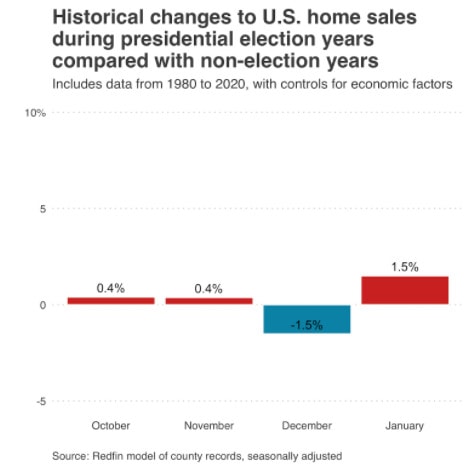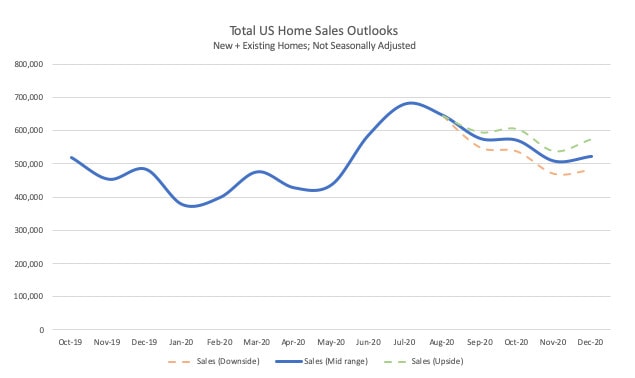Historically, home sales have remained relatively flat during presidential election seasons. We expect home sales to continue to grow this fall due to the coronavirus pandemic; we are forecasting more home sales in 2020 than in any year since 2006.
Twenty-two percent of homebuyers and sellers said the presidential election is impacting their plans to buy or sell a home, according to an August Redfin survey of more than 1,400 U.S. residents who plan to buy or sell a home in the next 12 months. That’s down from 32% in November 2019, per a similar Redfin survey. The drop from last year is likely due to the pandemic, which seems to be outweighing the election as a factor for homebuyers and sellers.
Thirteen percent of respondents to the August survey said the election is making them more hesitant to buy or sell a home, down from 20% in November 2019. Nine percent of respondents said the election is making them less hesitant to buy or sell a home, down from 12% in November. That’s unlikely to have a major impact on the housing market, partly because a portion of those people will probably buy and/or sell once the election has passed.
Sixty-five percent of homebuyers and sellers said the upcoming presidential election isn’t impacting their plans, up from 60% in November 2019.
Alisha Pruitt, a Redfin agent in Silicon Valley, said she doesn’t expect this year’s upcoming presidential election to impact real estate activity.
“Almost all the buyers I work with ask how the election could impact their home purchase,” Pruitt said. “I don’t have a crystal ball, but presidential elections have never seemed to affect the housing market much in the six election cycles I’ve been a real estate agent. The pandemic is having a much bigger impact, with low mortgage rates motivating buyers who want more space to work from home.”
Indeed, three-quarters of buyers and half of sellers say the coronavirus pandemic is impacting their plans this year. Forty-three percent of buyers said they’re planning to buy a home later than originally planned because of the pandemic, and 34% said they’re buying a home sooner than originally planned. Of sellers, 21% said the pandemic is delaying their selling plans, 19% said it’s accelerating their selling plans, and 10% said they’ve decided not to sell their home.
“Some home sellers—and buyers, to a lesser extent—are delaying their plans because of all the stress and uncertainty in the world, including the divisiveness surrounding the presidential election,” said Danielle Field, a Redfin real estate agent in Louisville, KY. “They don’t want to add one more stressful experience to their lives. I’m hopeful that once the election is over and there’s finally some certainty in this country, people will start putting their homes on the market again, creating more inventory for buyers.”
Past presidential elections have had minimal correlation with U.S. home sales rising or falling, which squares with Redfin’s survey findings. Home sales rose by an average of just 0.4% in October and November of presidential election years compared with non-election years, according to a Redfin analysis of home sales going back to 1980, which includes 10 presidential elections and controls for other economic factors such as changes in mortgage rates. In the December of presidential election years—the month representing closed sales for offers made during November, the election month—home sales dropped by an average of 1.5%, followed by a 1.5% recovery in January.

Redfin forecasts 6.2 million total home sales in 2020
All in all, Redfin’s model forecasts that about 6.2 million homes will be sold by the end of 2020, 3% more than in 2019, and the most homes sold in any year since 2006. The model also allows for a range of possible outcomes: It forecasts 6.08 million homes sold, 1% more than 2019, on the low end, and 6.4 million, 6% more than 2019, on the high end. Redfin’s forecast is based on many factors, including regional sales trends of new and existing sales, mortgage rates and income growth. The large forecast range is due to this election’s uncertainty.
“2020 has been unpredictable in almost every way, and the housing market is no exception,” said Redfin economist Taylor Marr. “Any expectations about the housing market from the beginning of the year—or from the beginning of the pandemic in April, when home sales nearly ground to a halt—have been shattered as low mortgage rates and the desire for additional space drives an uptick in sales.”
“Home sales typically don’t rise or fall much during the months surrounding a presidential election compared with those same months in non-election years, and although the upcoming election is happening at a particularly tumultuous time in our country’s history, I expect the trend to remain the same,” Marr continued. “While it’s possible this year’s election results may be up in the air for a few weeks and the delay could cause some people to hold off on buying or selling a home, the impact would likely be short-lived.”

Methodology
The analysis of elections’ impact on home sales is based on a TSLM forecast for monthly seasonally adjusted home sales from 1980 to 2020 across each metro where county records are available and nationally. The model predicts monthly home sales in each region, incorporating factors of previous trend, mortgage rates, consumer confidence, job growth, and a recession indicator. Then we estimate the expected effect on home sales during each October, November, December and January of presidential-election years. The average growth or decline in home sales noted above is the change that’s attributed to the election. For instance, if Redfin expects 500,000 home sales in the typical October, we expect 502,000 (0.4% more) in the October of a presidential election.
The post Redfin Survey: 22% of Homebuyers and Sellers Say the Presidential Election Is Impacting Their Plans appeared first on Redfin | Real Estate Tips for Home Buying, Selling & More.
